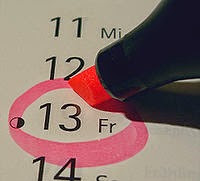It's not known for certain how the superstition surrounding this day arose, but both Friday and the number 13 are connected with the crucifixion of Christ (Friday being the day the crucifixion took place, commemorated weekly in Catholic practice, and 13 being the number of people present at the Last supper). According to Phillips Stevens, Jr., associate professor of anthropology at the University at Buffalo (SUNY), "There were 13 people at the table (at the Last Supper) and the 13th was Judas. The Last Supper was on a Thursday, and the next day was Friday, the day of crucifixion. When '13' and Friday come together, it is a double whammy."[3]
Friday has been considered an unlucky day to undertake journeys or begin new projects at least since the 14th century, as witnessed by Chaucer's Canterbury Tales.[4]
However, folklorists maintain that there is no written evidence for a "Friday the 13th" superstition before the 19th century.[5][6][7] An early documented reference in English occurs in Henry Sutherland Edwards' 1869 biography of Gioachino Rossini, who died on a Friday 13th:
He [Rossini] was surrounded to the last by admiring friends; and if it be true that, like so many Italians, he regarded Fridays as an unlucky day and thirteen as an unlucky number, it is remarkable that on Friday 13th of November he passed away.[8]
Rossini by Henri Grevedon
It's possible that the publication in 1907 of Thomas W. Lawson's popular novel Friday, the Thirteenth,[9] contributed to disseminating the superstition. In the novel, an unscrupulous broker takes advantage of the superstition to create a Wall Street panic on a Friday the 13th.[5]
Other possible contributing factors include:
In numerology, the number twelve is considered the number of completeness, as reflected in the twelve months of the year, twelve hours of the clock day, the twelve deities of Olympus, twelve tribes of Israel, twelve Apostles of Jesus, the 12 successors of Muhammad in Shia Islam, twelve signs of the Zodiac, the 12 years of the Chinese Buddhist cycle, etc. In contrast the number thirteen is considered irregular, transgressing this completeness.
There is a superstition, thought by some to derive from the Last Supper or a Norse myth, that having thirteen people seated at a table results in the death of one of the diners.
On Friday, 13 October 1307, hundreds of the Knights Templar were arrested in France, possibly giving rise to the fear of a curse on that day. This connection between the Friday the 13th superstition and the Knights Templar was popularized in Dan Brown's 2003 novel The Da Vinci Code and in John J. Robinson's 1989 work Born in Blood: The Lost Secrets of Freemasonry, and also in the Maurice Druon historical novel series: "The Accursed Kings" (French: Les Rois Maudits). However, experts agree that this is a relatively recent correlation, and most likely a modern-day invention.
Beware superstitious friends: It's Friday the 13th again! Here are some fun facts about the day you might not know:
Fear of the day is likely rooted in Christianity.
Jesus was crucified on a Friday and ever since the day has been associated with "general ill omen," Michael Bailey, a history professor at Iowa State University who specializes in the origins of superstitions, told USA TODAY Network. Weddings in the Middle Ages, for instance, were not held on Fridays and it was not a day someone would start a journey, Bailey said.
Thirteen guests are believed to have attended the Last Supper, the night before Jesus was killed, according to Stuart Vyse, a psychology professor at Connecticut College. And Judas Iscariot, the disciple who betrayed Jesus, is considered to have been the 13th guest, Vyse said.
The superstition's origins are mysterious.
It's unclear when Friday and number 13 became linked in the way we think of them today, according to Vyse and Bailey. There are no mentions of Friday the 13th before the 19th century.
Fear of the day itself has an official name.
It's called paraskevidekatriaphobia. Not sure how to pronounce it? NPR offers this handy audio guide.
You're not more likely to make a trip to the hospital.
A 2011 German study published in the World Journal of Surgery explored whether there is a link between Friday the 13th and an increase of blood loss and the frequency of emergency room visits on those days.
Researchers reviewed 3,281 days at a hospital facility that included 15 Friday the 13ths. They found no correlation.
"Our data indicate that such beliefs are myths far beyond reality," the study concludes.
Bonus fact: 13 is Taylor Swift's lucky number.
"I was born on the 13th. I turned 13 on Friday the 13th. My first album went gold in 13 weeks. My first #1 song had a 13-second intro," the singer told MTV in a 2009 interview.
The performer was even sued in 2014 by the clothing brand Lucky 13 for selling T-shirts on her online store with the phrase "Lucky 13" on them.
Contributing: Jolie Lee for USA TODAY Network
Enekem Greg
Wikipedia






No comments:
Post a Comment
Disclaimer:
Drop Comments
*Comments on this blog are NOT posted by ANY STAFF OF ENEKEM.
*ENEKEM Readers are SOLELY responsible for the comments they post on Enekem.com
*cheers*